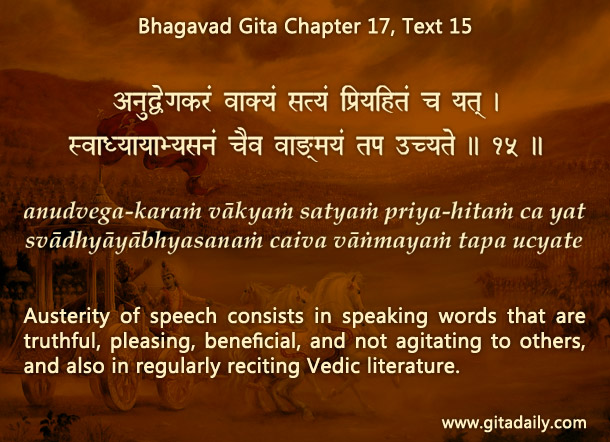The Bhagavad-gita (17.15) urges us to speak the truth sensitively — that is, in a manner which is non-agitating at the very least and pleasing at best so that the communication benefits its hearers. While such sensitivity in speech has been required throughout the ages, it has become all the more essential in today’s internet age. Why more essential? Due to three reasons: speed, fragmentation and longevity.
Speed: The internet has brought unprecedented speed to message transmission: a point spoken at one place can reach people all over the world within moments. In the past, a debatable point would have triggered only a local controversy that might gradually spread at the pace of snail mail. Nowadays, that same point can escalate into a global controversy within hours, maybe even minutes.
Fragmentation. Any communication is susceptible to being transmitted fragmentally, as when specific points from a talk are quoted out of context. In the age of the internet, fragmented communication has become much easier; anyone can share a screengrab of a part of a talk. And sharing such fragments is alluring for all those seeking online viewers: shorter fragments are more likely to be watched and thereby more likely to become viral. While some people may unintentionally share a point without its context, others may do so intentionally to entrap speakers in controversies that can jeopardize or even paralyze their speaking careers.
Longevity: Unlike in the past, where speakers could revise their speeches before the recording was made public, the internet has brought longevity to even the rawest forms of communication. Given that much content is streamed live nowadays, that content immediately gets stored on the net. Even if the content maker decides to remove a controversial point from their content, someone may already have downloaded that content and republished it elsewhere. The capacity for deleting irrecoverably anything that has made its way onto the internet is vanishingly low. What goes on the internet once stays there for a remarkably long time, ever-available to anyone who searches shrewdly enough.
When we thus contemplate the hazards associated with communication in the internet age, we can take responsibility to infuse greater sensitivity into our speech.
Summary:
The internet age has brought far greater speed to communication, made speech more vulnerable to fragmented transmission and imparted to online posts an almost unerasable longevity — therefore, we need to be especially sensitive in our speech.
Think it over:
- Why does communication in the internet age require heightened sensitivity?
- Can you recollect any incident when you personally experienced the hazards of online communication?
- Which of these hazards impels you the most to cultivate greater sensitivity in your own speech? Why?
***
17.15: Austerity of speech consists in speaking words that are truthful, pleasing, beneficial, and not agitating to others, and also in regularly reciting Vedic literature.
Audio explanation of the article is here: https://gitadaily.substack.com/p/why-sensitivity-in-speech-is-especially

To know more about this verse, please click on the image

Hare Krishna Prabhu,
This is one of my favorite slokas.
(1) To perform Tapas (penance) we need not withdraw from worldly duties to an Himalayan caves or to an ashram. We can perform Tapas by speaking all the time – without causing agitation to the listener, in endearing way, yet completely truthful and most importantly in a way that is helpful to them.
(2) So, we can be engaged in our worldly duties and yet perform Penance at the same time. We don’t have to give up spirituality for the sake of the world or the give up the world for the sake of spirituality. This is succinctly stated by Bhagawan Sri Krishna “Mam anusmara Yuddhyacha” – perform worldly duties while mentally connected to Me.
(3) Words spoken by us cant be withdrawn. They are permanently recorded in the mind of the listener. We also don’t know what impact it will have on the listener. This is especially true of impressionable minds of children. one sentence can destroy the confidence of a child and can impact his entire life.
(4) the safest use of our speech faculty is study of sacred scriptures like Bhagawad Gita and Bhagawatam.
This sloka can be used by everyone at all time.
Thank you for your thoughtful comment.
Wonderfully picked subject! Thank you!!!